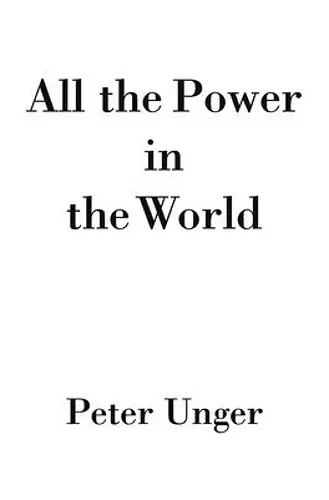All the Power in the World
Format:Paperback
Publisher:Oxford University Press Inc
Published:29th Nov '07
Currently unavailable, and unfortunately no date known when it will be back
This paperback is available in another edition too:
- Hardback£72.00(9780195155617)

This bold and original work of philosophy presents an exciting new picture of concrete reality. Peter Unger provocatively breaks with what he terms the conservatism of present-day philosophy, and returns to central themes from Descartes, Locke, Berkeley, Hume and Russell. Wiping the slate clean, Unger works, from the ground up, to formulate a new metaphysic capable of accommodating our distinctly human perspective. He proposes a world with inherently powerful particulars of two basic sorts: one mental but not physical, the other physical but not mental. Whether of one sort or the other, each individual possesses powers for determining his or her own course, as well as powers for interaction with other individuals. It is only a purely mental particular--an immaterial soul, like yourself--that is ever fit for real choosing, or for conscious experiencing. Rigorously reasoning that the only satisfactory metaphysic is one that situates the physical alongside the non-physical, Unger carefully explains the genesis of, and continual interaction of, the two sides of our deeply dualistic world. Written in an accessible and entertaining style, while advancing philosophical scholarship, All the Power in the World takes readers on a philosophical journey into the nature of reality. In this riveting intellectual adventure, Unger reveals the need for an entirely novel approach to the nature of physical reality--and shows how this approach can lead to wholly unexpected possibilities, including disembodied human existence for billions of years. All the Power in the World returns philosophy to its most ambitious roots in its fearless attempt to answer profoundly difficult human questions about ourselves and our world.
Unger has always been a very original and independent philosopher, never swayed excessively by fashion. One of the two main themes of All the Power in the World is a defense of the dualist view that mental substances or individuals are wholly non-physical, and have the power to make things happen in the physical world. For example, we have the power to act freely, and the evident exercise of this power is incompatible with physicalism.... This argument is familiar, of course, though Unger's own version of it is characteristically inventive. Less familiar are Unger's ingenious arguments for dualism later in the book, based on 'the problem of the many' for which Unger is well known.... In a fascinating discussion... Unger draws the conclusion that he is not a physical thing: dualism is true and physicalism is false. * Tim Crane, Times Literary Supplement *
All the Power in the World brims with imaginative and engaging ideas on matters of basic metaphysics.... it is worth the careful attention of all with a taste for grand metaphysics. * Timothy O'Connor, Notre Dame Philosophical Reviews *
Every page of All the Power in the World will provide seasoned philosophers, particularly those working in metaphysics and the philosophy of mind, with much to think about. To the extent that Unger set out to write a book that is supremely thought provoking, he has succeeded in spades. * John Heil, Nous *
Every page of All the Power in the World will provide seasoned philosophers, particularly those working in metaphysics and the philosophy of mind, with much to think about. To the extent that Unger set out to write a book that is supremely thought provoking, he has succeeded in spades. * John Heil, Nous *
All the Power in the World brims with imaginative and engaging ideas on matters of basic metaphysics.... it is worth the careful attention of all with a taste for grand metaphysics. * Timothy O'Connor, Notre Dame Philosophical Reviews *
ISBN: 9780195339345
Dimensions: 155mm x 234mm x 41mm
Weight: 955g
670 pages